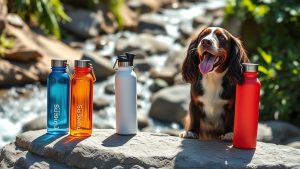
If you notice your dog has a dry nose, sticky gums, or exhibits lethargy, these could be signs they need more water. Keep an eye on their appetite and watch for excessive panting or drooling. A dry coat or loss of skin elasticity also indicates dehydration risk. Behavioral changes like reduced playfulness or refusal to drink are important cues as well. Recognizing these signs can prevent serious health issues, and there's more critical information to reflect on.
As a responsible dog owner, it's vital to recognize when your furry friend needs more water, especially since dehydration can quickly become a serious issue. Dogs rely on adequate hydration for their overall health, and knowing the signs of dehydration can help you take action before it escalates.
One early indicator is a dry nose; if you notice your dog's nose feels unusually dry, it may be a sign they need to drink more. Additionally, check their gums; if they appear dry and sticky, that's another red flag.
Lethargy is another significant warning sign. If your dog seems unusually tired and less energetic than usual, it could mean they're dehydrated. Alongside this, a loss of appetite often accompanies moderate dehydration. If your pup turns their nose up at food, it's time to assess their water intake.
In severe cases, you might notice their eyes appearing sunken, which is a serious concern and requires immediate attention. Excessive panting can indicate overheating, often leading to dehydration. If your dog is panting more than usual, especially in warm weather, they mightn't be getting enough water.
Similarly, excessive drooling can be a sign they're trying to cool down, which could also point to dehydration. Pay attention to their mouth; a sticky or dry feeling indicates they may need more fluids. If they seem weak or confused, it's important to take this seriously, as these symptoms may indicate severe dehydration. You should also monitor their heart rate, as an increased rate can accompany this condition.
Skin and coat changes can also help you assess hydration levels. Performing a skin elasticity test by gently pinching the skin on the back of their neck can reveal hydration status; if the skin doesn't snap back quickly, your dog may be dehydrated. A dry coat or a tacky skin feel further indicates a lack of moisture. Loss of skin elasticity can be a clear sign of a dog needing more water.
Furthermore, if their gums appear pale, this could signal circulatory issues linked to dehydration. Behavioral changes are significant too. If your dog is less active and shows a loss of interest in play, dehydration might be the cause. Decreased social interaction or altered vocalizations can indicate discomfort, possibly stemming from low water intake.
Refusal to drink water is a pivotal sign that something's wrong. Environmental factors can exacerbate dehydration. High temperatures, exercise in warm weather, and humidity can all increase the risk. Be mindful of your dog's water intake, especially if they've health conditions like gastrointestinal issues, kidney disease, or diabetes, which can elevate their hydration needs.
To prevent dehydration, make sure your dog has access to fresh water at all times and encourage them to drink after meals or play. Incorporating water-rich foods into their diet can also help keep them hydrated. Regular veterinary check-ups are important for monitoring your dog's health.
Conclusion
Ensuring your dog stays hydrated is essential for their health and happiness. By recognizing the signs of dehydration—like excessive panting, dry gums, or lethargy—you can take action to keep them comfortable and thriving. Remember, a well-hydrated dog is a playful dog, a healthy dog, and a happy companion. Regularly check their water bowl and encourage them to drink often. Investing a little time in their hydration today can lead to a lifetime of joy and wellness for your furry friend.



